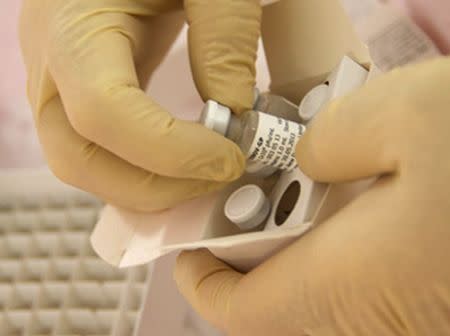Canada to ship experimental Ebola vaccine to WHO in Geneva

TORONTO (Reuters) - The Canadian government will ship 800 vials of its experimental Ebola vaccine to the World Health Organization in Geneva beginning on Monday, the Public Health Agency of Canada said on Saturday. The WHO, in consultation with health authorities in the countries most affected by the outbreak of the disease, will decide on how the vaccine will be distributed and used, the agency said in a statement. The vaccine is undergoing clinical trials on humans at Walter Reed Army Institute of Research in the United States after showing promising results in animal testing, it said. The Canadian government said in August it would donate between 800 and 1,000 doses of its VSV-EBOV vaccine to the WHO for use in Africa, but the vaccine remained in a government lab as Canadian and WHO officials grappled with logistical and ethical issues. The vaccine was developed at Canada's National Microbiology Laboratory in Winnipeg, Manitoba. The Canadian government has said that because the vaccine is experimental, it is not sure exactly how many people could be immunized or treated with the amount being shipped. The vaccine vials are being sent to Geneva in three separate shipments, as a precautionary measure, as the vaccine must kept at a very low temperature at all times, the Canadian government said. Iowa-based NewLink Genetics Corp holds the commercial license for the Canadian vaccine and said in August that it would be able to produce tens of thousands of vaccine doses within a month or two. Canada, where there are no documented Ebola cases, will retain roughly a third of the vaccine for its own needs. The Ebola outbreak, which was first confirmed in March, is the largest on record and has killed more than 4,500 people, most of them in the West African countries of Liberia, Sierra Leone and Guinea. President Barack Obama urged Americans on Saturday not to give in to "hysteria" about the spread of the virus. Three Ebola cases have been diagnosed in the United States and dozens of people are being monitored in case they contract the illness. (Reporting By Jeffrey Hodgson; Additional reporting by Frank McGurty in New York and Rod Nickel in Winnipeg; Editing by Raissa Kasolowsky)

